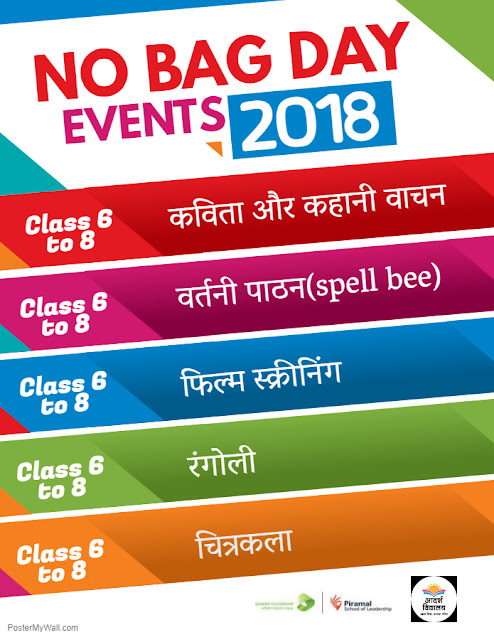A lot is taught but little is learnt!
Concern regarding the academic burden of students and unsatisfactory quality of learning have been voiced repeatedly in our country.
Yashpal committee has highlighted the same which stated that “A lot is taught but little is learnt or understood”. In their report of Learning without Burden 1993, which says that opportunities for children to carry out experiments, excursion or any kind of observation are very scaring and textbook asking children to observe a picture of the object under the study rather than asking children and teacher to go out and observe the object in nature itself.
 |
| A teacher is engaging her students actively with the help of Baal-Geet in JP Janu Senior Secondary Schools, Jhunjhunu |
 |
| Patitapaban is having professional learning community meeting in one of his schools. |
He has observed that if we provide an opportunity to children to share their day to day knowledge and experiences of the world around them, the trees that they have climbed, the fruits they have eaten, the birds they have admired. The pace of their learning, their participation and ownership in the process of learning gets enhanced. He has also observed that children of class 2 have a rich language base but rarely anyone ask children to talk about or refer to the world outside the school.
A teacher had actively engaged her students with the Baal-Geet "Motu Ram Halwai"
In another process of the fellowship named Community immersion (CI), he started a 14 days sports development camp with an objective of team building, engaging in the decision-making process and creating a joyful learning environment. The turn up of students was low during the first two days (2 students only) followed by high for rest of the day (28+ students daily). The observation was more fine-tuned during engagement with sports development camp. He understood that participation of all children in free play, informal and formal games, Yoga and sports activities is essential for their physical and psycho-social development. The range of abilities as a result of games, sports and yoga will improve stamina, fine gross motor skills, self-awareness, control, and coordination. Simple adaptation of playgrounds and rules help children understand the importance of norms and their significance in establishing processes.He has understood that there is a lack of spaces for children to share their creative work. His experience suggests him that when children speak, they are usually answering the teacher’s questions or repeating the teacher’s words. They rarely do things, nor do they have opportunities to take initiative. Space needs to be developed that enable children to find their voices, nurture their curiosity—to do things, to ask questions and to pursue investigations, sharing and integrating their experiences with school knowledge
Based on learning of the first year he and his teammates of Jhunjhunu conceptualize the idea of No Bag day with an objective “to create a space for channelizing the energy of children by the opportunity to express self in a joyful learning environment”. Further to this, the focus was on -
A) Prioritizing the opportunities for children where the possibility to explore day-to-day resources around them are more.
B) Appreciate the creativity of children and encourage cultural values
C) Children are able to understand the importance of listening, expressing self and communication, Furthermore, space was also utilized to highlight the talent of kids by engaging the community and collaborating with them in the process of child’s learning. A study cum survey conducted by the team of Gandhi fellows of Jhunjhunu Cluster was part of the phase of idea conceptualization. The focus was on socio-emotional learning of children. The team has found that there is a need to create fear-free & Joyful learning spaces. The spaces for child creativity need to be nourished. The absence of these spaces may lead to resulting in the absentees of children in schools, slow learning pace of a child etc.
Basic data of Survey conducted
Schools Involved 46
Student’s involved 5220
Teachers Involved 386
Total No. Of Events(Acc. to Age Groups 30
Total No. Of individuals engaged 5800
Community Members 112
Based on this survey the activities of no bag day was designed. The key principal during designing the activities was to give space to children’s experiences, their voices, and their active participation. The activities were planned considering children’s psychological development and interests with the idea to respond to physical, cultural and social preferences. Thus, the activities are focused around drawing, stimulating, playing, acting, singing, debates, music, drama, speaking and narrating, self-identification, self-assessment. Primary classes specifically Class one and two children gauge with painting their own world and class 3 to five are engage in storytelling, BAL Geet and drawing. The upper primary and secondary classes are involved in spell bee, letter writing and essay writing. The children are getting involved in activities like Kabad se Jugad (best out of waste), creating their own stories and poems, writing an incident, which they like, or dislike, quiz etc.
 |
| A Group photograph was taken after the successful inauguration of Joyful Saturday at GSSS Bakra |
Priyanka (GSSS Rampura) is performing a melody on the joyful Saturday event at GSSS Hamiri Kalan, Jhunjhunu
Some Posters developed for the events are shared below.
NB: Please leave us your valuable comment in the section below. We are open to constructive changes.













Very informative article! If anyone’s looking for authentic spiritual items, I recommend Braj Store religious products – they offer original gemstones, yantras, and more with great quality.
ReplyDelete